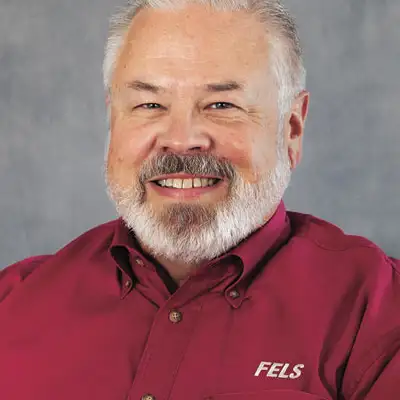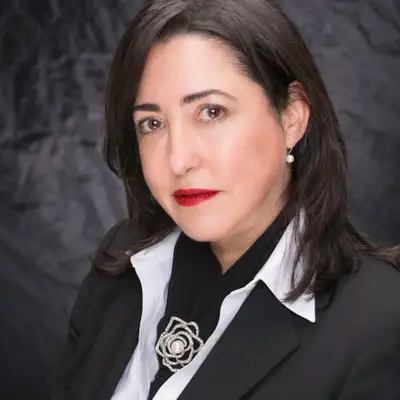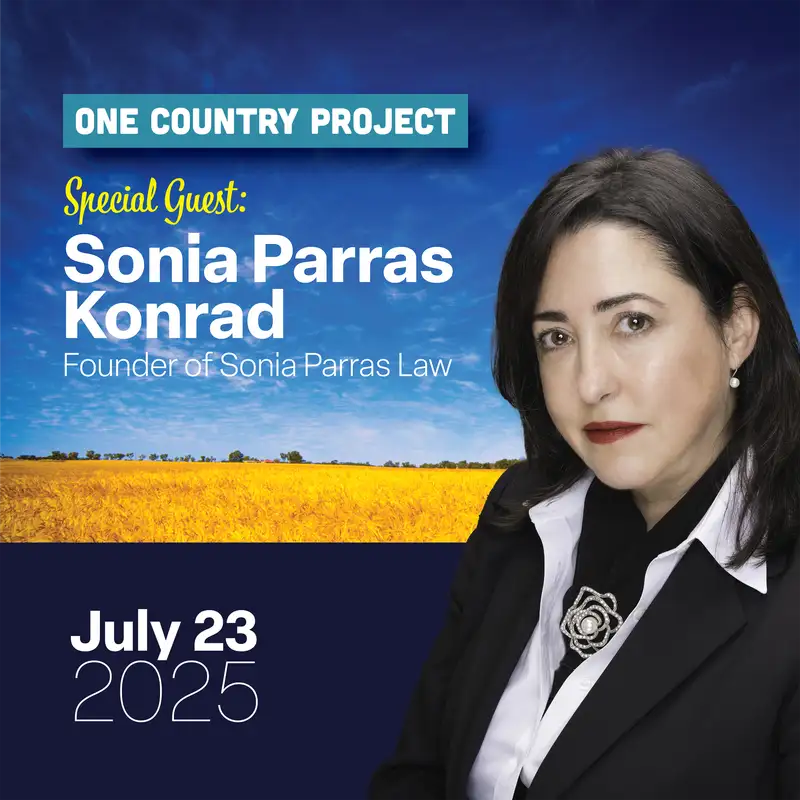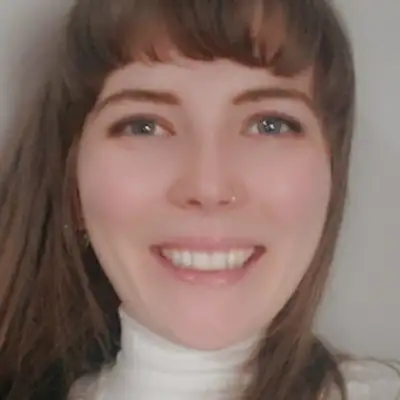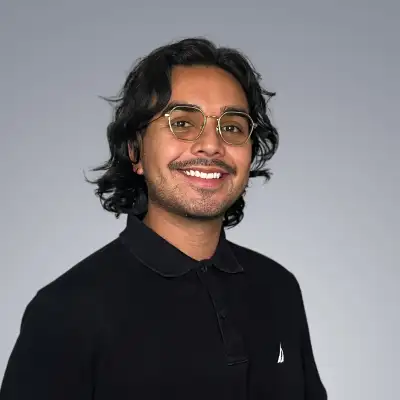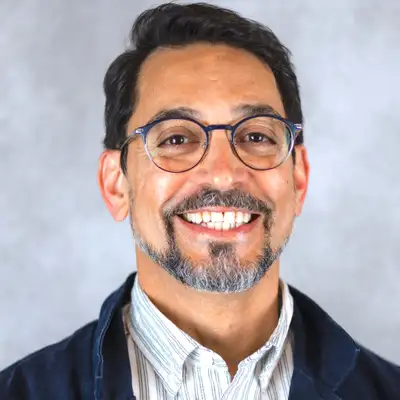Immigrants in Rural America
Joel Heitkamp [00:00:00]:
Welcome to the Hot Dish, comfort food for rural America. I'm Joel Heitkamp. Heidi couldn't join me today, but you'll hear later with Sonia Parras Konrad, an immigration attorney in Iowa. They had a great chat about her experience dealing with the ridiculous and harsh administrative policies like we're seeing now. And I got the joy of chatting with Bryan Little, Director of Labor Affairs for the California Farm Bureau. We talked about all things agriculture and labor and learned about the labor perspectives on all this. We're excited to hear from you. So let's get started with my conversation with Bryan Little.
Joel Heitkamp [00:00:39]:
You know, we listen to your feedback here on the Hot Dish. We oftentimes ask what you're interested in, what you want us to bring to you. One of the things that's talked about is farm labor, what the current policies are doing to farm labor, how it is affecting those of us in the rural areas. Of course, that's one of the focuses of One Country and the Hot Dish. Well, Bryan Little is somebody who understands farm labor. In fact, what he does is best explained by him. He's our guest now. Bryan, good to have you on the Hot Dish.
Bryan Little [00:01:13]:
Thanks, Joel. I appreciate it. Actually, I joke at times that I spend 75% of my time working for Farm Bureau and 75% of my time working for Farm Employers Labor Service. And I was just a poor dumb poli-sci major and even I can figure out how that math worked. But there's a lot to do in California. We employ around 800,000 people that do some ag work at some point in the year. And during our peak harvesting seasons, we're employing about 480,000 people on any given day. So there's a lot there to chew on in terms of how the state of California likes to regulate employment.
Bryan Little [00:01:43]:
And California loves to regulate everything that moves. So there's a lot there that we have to worry about. And then that's what I do for Farm Bureau is dealing with the legislature and dealing with our very active regulatory community that's part of California state government. And then the other half of my job is I run a small for profit company that California Farm Bureau owns that tries to help agricultural employers understand and do all the things that the state and the feds want them to do in their capacity as employers. And that's a lot. We actually sat down and counted one day last year that farmers in California are expected to post 54 different things in their workplace to inform their employees about their various rights and other things like that that farmers are required to inform Them of and we have a product designed to make it easy for them to do that. So we try to be the easy button for farm employers.
Joel Heitkamp [00:02:31]:
In California, I don't know what terms you use, but here in the Midwest we use bulletin board. So I don't know where you put 50 postings on a bulletin board. How big is the bulletin board?
Bryan Little [00:02:43]:
It's big. That's one of the problems we've been trying to get around. So we have this piece of agricultural equipment in California that we invented in 2010 or so called the Shade Trailer. It's a two wheel trail that's basically a picnic table on a trailer that has wings that fold up to provide shade for people to sit on the trailer. Because of our Heat Illness Prevention standard requires employers of outdoor employees to provide shade for them to get into on a hot day. A lot of times you'll see ag employers will hang those posters underneath those wings so when they're folded out providing shade for people sitting at the picnic table, they can look up and see the posters. The requirement is that the posters have to be somewhere where employees can see them without having to ask to see them. So we've tried a lot of different things over the years and there really is no way around the fact that it just covers a lot of a lot of space and people are running out of places to put it.
Bryan Little [00:03:34]:
And yet our legislators and regulators keep adding new things that we have to provide postings on.
Joel Heitkamp [00:03:40]:
Well, as a former legislator and someone who served in the North Dakota Senate for 14 years, you would not have a hard time making an argument with me that you need to get rid of some of those posters. It wouldn't be a hard argument to make at all. Bryan, want to talk a little bit about your background when it comes to labor? I think this is universal, albeit the different commodities you raise versus what we raise here in the middle of this country. The shortage, just the need, the qualification, the ability to do that level of work every day. You know, a lot of people don't think of agriculture culture when they think of California. Where are you at when it comes to labor?
Bryan Little [00:04:23]:
Well, California is the largest ag production state in the United States. Now given that California is a huge state, I mean it's 800 miles from the Oregon border to the Mexican border. So it's a big state and a lot of rural area people think of California, they think of the Bay Area and they think of the LA Basin. Maybe Fresno comes to mind occasionally, but for the most part that's what they think of. And Surfing and the beach and all that stuff. But we grow everything. We grow 400 different commodities in California. So we grow everything from avocados to zucchini.
Bryan Little [00:04:53]:
We're the largest dairy production state in the United States. So there's a lot going on here agriculturally. And that's why I was telling you about earlier that we have about 800,000 people that do at least one job at some point during the year, because that's how their employers report their taxes. And then during our peak harvesting seasons, which will kick off in about three weeks here, we'll be employing about 480,000 people every day doing something. And that will continue through about the middle of October. So there's something happening in California just about every day of the year, growing something. Wine, grapes, tree fruit, tree nuts, vegetables, leafy greens, fruit and vegetable, all berries. I mean, berries like you wouldn't believe.
Bryan Little [00:05:35]:
They're all over the place. We're doing our best to try to automate and as much of it as we can, because California agriculture is different from agriculture in the Midwest, where my brother in law will periodically send us video of himself watching South Dakota State Jackrabbit's football on his laptop and his combine was combining his beans. Well, you know, we don't, we don't have those kind of commodities and that kind of machinery in California that lends itself to that kind of automation, although we're working on it as fast as we can. But try to imagine what kind of machine would be required to harvest strawberries. That, that machine has not been invented yet. And I don't know if we'll ever get there.
Joel Heitkamp [00:06:13]:
Yeah, well, just two points there and what you just said. Number one, North Dakota State University beat South Dakota State University in the national championship this year. But I don't want to be petty and bring that up. Also zucchini, we raise it too. And the one time of year you lock your car is when it's zucchini season, because you don't want a bunch of people dropping it off in your car. And then you got to deal with it. Bryan, I want to talk the serious issue though, that we ended up bringing up here, which was just the harvest, the seasonal harvest. How many of these workers are day workers or week workers?
Bryan Little [00:06:51]:
Most of them are going to be employed. It depends on the situation. Some commodities have relatively short harvest periods. To give you an example, sweet cherries in Lodi, which is about 25 miles south of Sacramento in Central Valley, that's about a three week harvest. But the people that are doing that work, they live in Lodi and Stockton and Elk Grove and the other communities right around there. And they do that work for two or three weeks, and then they go find other ag work to do in other parts of California. The people who do ag work in California, that's mostly what they do for a living. They might do several different things over the course of the year, but when there's something available close by to where they live, they'll usually take those jobs and work those jobs for as long as they last.
Bryan Little [00:07:35]:
And if they're done harvesting cherries, then they're probably going to get a job working on the tomato harvest somewhere else in the Central Valley and then move on to tree fruits and some ground growing vegetables like melons and cucumbers and things like that. So we grow again, we grow so much stuff in California that's not hard for people to put together Many, many weeks of ag employment if they are a little bit diligent about it and they maybe are willing to drive a little bit in order to do those jobs. Ag workers in California, on average, work about 36 weeks in agriculture out of a year. So it's not something that you can do 52 weeks a year because the work, just a lot of time isn't available during the winter months. But during the rest of the year, there's something going on in California pretty much every day.
Joel Heitkamp [00:08:22]:
Okay, I want to talk a little bit about my background on some of that as well. Before we raise sugar beets here and before we got to the point where we could apply chemical to kill a lot of the weeds that would stop some of the sugar beet roots from growing, we hold them in my summers, you know, we got paid to hoe. And what I know is the migrant workers, the immigrant workers that came to the north to do that, could do a quarter of land and what it took us, you know, about three weeks to do one. In other words, they were better, they worked harder, and they were quicker. My, my suspicion is when comes to your seasonal work, many of the individuals that you need are Hispanic. That the people that come are very good at what they do, but they might be first generation immigrants. And, you know, I hope we can have a conversation here about whether or not some of them are even here legally. And so is my suspicion right?
Bryan Little [00:09:27]:
You're partly right and partly wrong. The part where you're not right is that a large part of our population have been residing in California. Yes, they are Hispanic. Many of them immigrated from Mexico and other Central American countries. But in many cases, that was 20 and 30 years ago. So they've lived in California for decades. Many of them, they have families here. They have spouses who either may be immigrants themselves or they may be green card holders.
Bryan Little [00:09:57]:
They may be citizens. They have children who are United States citizens because they were born here. Their kids are going to the local schools. And these people are not, by and large, raising their kids to be farm workers. They're raising them to be public defenders and school teachers and lawyers and plumbers and engineers and all kinds of things, because we have a very comprehensive state university system in California and community college system that offers great education for not a lot of money. So there's a lot of things these people can do, a lot of professional opportunities for their children to be able to do things other than agriculture, which is one of our problems here as an industry, is that our workforce is getting older every day, just like I am and just like you are. And doing agricultural work in California is a great job for a younger person, maybe not so much for someone who's as old as me. And then to answer your other question, yes, you are right, a great many of them did not emigrate to the United States legally back in the 1980s and 1990s when they came here and settled here.
Bryan Little [00:11:03]:
California Farm Bureau and American Farm Bureau, too, have been advocating for decades. I mean, I worked at American Farm Bureau back in the 1990s, and we were advocating then for a path to some sort of status that would allow our workforce who originally came to the United States not legally, because there was no good way to do that at the time, to allow them to be able to earn a status, to allow them to work legally in the United States, and then to make some improvements to make our temporary ggricultural visa worker visa program more affordable, more usable, and more readily available so that we could rely on that when we need to.
Joel Heitkamp [00:11:40]:
Has ICE or the Trump Administration as a whole uh crackdown on finding out whether or not some of these workers are here legally? Because, you know, there was this exemption that was supposedly given to ag and given to hotel workers. And so I'm curious, are these workers, whether they're here legally or not, working in fear?
Bryan Little [00:12:04]:
So one piece of that that need to back up and make sure that we're clear about is that one thing you commonly hear, you hear these people refer to as undocumented workers. Nobody is undocumented. Everybody has documents. You can buy all the documents you need at a flea market anywhere in California to do work up virtually any job that you can qualify for, for $1,000. It's just, it's just not that hard to do. Usually that's going to consist of a California driver's license and a Social Security card, or it could consist of a Social Security card that you can then and a confident birth certificate that you can then take the California DMV and get a California issued driver's license. So there are a lot of different ways you can get all the documentation you need to be able to offer documents to an employer so that your employer can complete the i9 process before they hire you. And I only emphasize that because I think there's a lot of misconceptions out there that farm employers commonly hire people who they know are undocumented.
Bryan Little [00:13:03]:
And that just is not true. You know. Now, what was your question, Your, your original question, Joel?
Joel Heitkamp [00:13:10]:
My original question is whether or not they're legal workers or not, which clearly you've pointed out, some are, some aren't. Because if you're going to a flea market to do that, clearly you've brought documentation that isn't accurate. So do they work in fear? Do they work in a way where any given day they're looking over their shoulder wondering or not they're going to be the one deported?
Bryan Little [00:13:37]:
So a funny thing happened on the way to the President's Inauguration back in January, the week before the Inauguration, whoever it was that runs the Border Patrol office in El Centro, California, decided he was going to maybe he wanted to make sure he kept his job in the new Administration. I don't know what was going on there, but he initiated an Enforcement Action in Bakersfield and started going out and picking up - officially, he said he was picking up criminal illegal aliens. So the kind of people we've heard talked about in the course of all the conversation around all of this in the last six months or so. And from what I could discern, that's a lot of what was happening there. They were actually doing that. But the funny thing that happened, and it's happened over and over and over again since January, is that when any law enforcement agency seems like does anything from a sobriety checkpoint to the Department of Homeland Security's Homeland Security Investigation Service taking down the child pornography ring in Winters, California. It's about 25 miles from Sacramento going toward San Francisco. It gets reported in local social media like Facebook and Instagram and all that stuff as, oh my God, ICE is here and they're arresting farm workers and they're doing enforcement on farms.
Bryan Little [00:14:58]:
So far I have yet other than what happened in Ventura county, in the wake of the LA riots, I haven't been able to find an instance. I keep getting reports that these things are happening. And I always go and check contact people I know, because I've been doing this job for 16 years, I know people all over the state, contact people I know in those areas and say, what's happening? What do you. What have you heard? What's going on? And very often the first thing that I get is, well, yeah, we're hearing that ICE is doing enforcement out here and then they poke around a little bit and learn a little bit more. And it turns out that it's the. Like the story I told you before about Homeland Security investigations taking down a child pornography ring or a human smuggling ring, or in the case of. We got a text from a county Farm Bureau executive a couple of weeks ago saying that she had heard that ICE was in Thermal and Mecca, which are farming communities in eastern Riverside county, that ICE was out there doing farm site enforcement. Turns out what was actually happening was that the National Guard and DEA were suppressing an illegal Chinese pot grow in the desert.
Bryan Little [00:16:06]:
But that got reported as ICE out there doing stuff. So ICE wasn't in every case I've investigated and followed up on. ICE has not been doing farm site enforcement. It's always been somebody doing something else that gets reported that way in social media. And then that echoes off legacy media, which then in turn echoes off the social media. And the more spectacular and lurid you make these reports, the more likes and clicks and shares you get in the social media driven world that we live in these days. Which is, I guess, okay if you're trying to get likes and clicks and shares. But it's pretty tough on our employees in our industry who are trying to make a living and support their families, just like you do and just like I do every day, who don't know if it's safe for them to go to work.
Bryan Little [00:16:57]:
And there have been some pretty colorful and alarming stories about people who should not have been detained, who were actually. People who were actually US citizens being detained. I don't have any firsthand knowledge if any of that is true, but if any of it is true, it certainly is concerning. And that is causing agricultural employees in California, to the extent that they can in some cases, to elect not to go to work. I know of at least one strawberry producer in Ventura County who lost about 60% of his crop because he, in the wake of the LA riots, because the ICE and Border Patrol were up in Ventura County doing whatever it was they were doing, you might have seen last week they conducted a raid on a cannabis production facility in Ventura County. So because we have adult use cannabis legal in California, it's still not legal federally. And so ICE was going out and picking up people who were here on visas. This is just last week picking up people who are here on various visas on temporary protected status, green card holders, a variety of others.
Bryan Little [00:18:09]:
There's a whole variety of visas that people have been able to get last several Administrations. The problem is that if you are engaged in cannabis production, that's a federal felony. And if you engage in a federal felony, then if you are here on a visa, you're immediately deportable and ICE can pick you up and deport you right away. If you're a green card holder, it would prevent you from ever being able to apply for citizenship if that's what you want to do. And a great many green card holders will do that eventually. So it's. And because cannabis production in California happens cheek by jowl with food production in California. It's all co-located, they're all right next to each other.
Bryan Little [00:18:51]:
It has the effect of really scaring our workforce in California. And they try to avoid going out and going to work when this stuff is going on around them. And that makes it really tough for food production. You know, in California, we produce about half the fruits and vegetables the rest of the United States consumes. So it's just going to make it really tough for us to be able to produce strawberries and blueberries and all the other delicious things that we grow in California that folks all over the country want to eat.
Joel Heitkamp [00:19:20]:
Well, National Farm Bureau is usually an organization with an Administration like this that would have a connection or two issue in both the ag department and all the way up to the top. And so as anybody spoke to them, as anybody spoke to the Administration and said, you know, other than a press release saying that, you know, you're not going to target farm workers, you know, if they're working in fear and the strawberry farmer is losing a huge part of his workforce, how do you get word out other than through the Administration itself saying, look, you're okay?
Bryan Little [00:19:56]:
That's a very good question. And to be honest, all the back and forth with this Administration about we are going to target, we're not going to target, we are going to target, maybe we will target, you know, has caused a lot of confusion and a lot of consternation. And so that has made things more difficult than it than they really needed to be a little more clarity about what their policy is and what the direction is they're going in could have been very helpful. Now, in a lot of ways, the genie is kind of out of the bottle and it's going to be very difficult to put it back and it's going to be difficult to convince people that they can. Well, for example, one of the things they're talking about trying to do is to have farmers this Administration is talking about trying to do is to have farmers be able to vouch for the long term work for me on my farm and that employees would be able to exit the country and touch back. The idea being they go back to where they came from and then they can re enter the United States legally. In theory, that sounds great. The problem is that most of these people have been here for 20 and 30 years and so they have no home to go back to.
Bryan Little [00:21:12]:
And with all that's happened in the last six months, I'm not sure that you would have a great many people who would be willing to trust that that program will actually work the way that it's being sold to them. So I think you might have difficulty getting people to participate in that program.
Joel Heitkamp [00:21:27]:
Yeah. And there's examples I think they could go to to justify some of that. Bryan, great conversation. Could do it all day long. Keep sending those vegetables, those nuts, everything you raise to the middle of this country as well. Thank you, Bryan.
Bryan Little [00:21:43]:
Thank you.
Joel Heitkamp [00:21:44]:
And now I'm going to turn it over to Heidi and Sonia Parras Konrad. They'll take it away. Heidi?
Heidi Heitkamp [00:21:51]:
We've been getting a lot of questions about the effects of the Administration's immigration policies on what's happening in rural America. Who's out there? What are the status of so many of the folks who are providing assistance in meatpacking plants or working picking vegetables or working in the local hotel. And we all know that there is an acute labor shortage many times in rural America. We wanted to invite an expert and that's exactly what we did. So Sonia Parras Konrad, she's an activist, attorney and educator on legal remedies for immigration, survivors of gender violence and labor trafficking. She's founded numerous nonprofit organizations and she has been providing immigration technical assistance to frontline advocates and attorneys. Never more than now has that assistance been needed. Sonia, thank you so much for joining us on the Hot Dish and thank you so much for the work that you're doing.
Heidi Heitkamp [00:22:52]:
I think to start out, if you could just give us a sense of the continuum because you didn't start this work with this Administration. You've been working in this area a long time. What changes have you seen both in terms of process and the work that you do, but also so the attitudes of your clients and the concerns of your clients?
Sonia Parras Konrad [00:23:13]:
Well, thank you so much for having me. It is my pleasure to share information with you in this very important topic that affects not only us as community, but also, you know, anyone that we welcome into our communities. Obviously, I've been doing this work for almost 29 years. And the difference between doing this work with other many Administration, including the prior Administration, is that we had a sense of trust, even though we are in opposite sides, for instance, with the Office of Chief Counsel or with ICE. We knew that they were tasked with doing a job following a series of rules that everybody was familiar with. The way that we're practicing today is very, is terrifying because nobody knows what the rules are going to be tomorrow. So we are preparing for what we know today.
Sonia Parras Konrad [00:24:11]:
But tomorrow we have yet another regulation, another change in policy. The way that my colleagues, because we see each other in the community, ICE agents and US officers and judges are now working in silent and losing our communications and gatherings where we, we used to exchange what problems are we facing and how we can solve this together to provide fair services or do our jobs following the rules. That's no longer here. We are in very uneasy waters and not in a trusting way working against each other. Very divisive, very isolated.
Sonia Parras Konrad [00:25:05]:
Yes.
Heidi Heitkamp [00:25:05]:
Right. So if you can just help me kind of understand your clients, because most people say, oh, all of these people are alike. They all have the same status. And you work a lot with refugees. You work a lot with people who, you know, by, prior to this Administration, were in the country as we saw it legally or were given some status that enabled them to work. But a lot of that now has been turned upside down because the Administration has revoked a lot of those permissions. And so could you just kind of start from. These are the kind of range of legal statuses that you deal with.
Sonia Parras Konrad [00:25:45]:
Okay. So my expertise, my dedication is on humanitarian immigration relief. So I work a lot with children. We have all these juvenile visas for kids that are unaccompanied and came alone into this country. I do U-visas for victims of human for victims of certain crimes of violence. I do T-visas for trafficking survivors. I also do family, family petitions. And I work a lot with people that have mixed immigration relief.
Sonia Parras Konrad [00:26:23]:
So they may have TPS because they are from Venezuela.
Heidi Heitkamp [00:26:28]:
Can we get, TPS is Temporary Protected Status, right? This is an area that's rife with acronyms that I know a lot of our listeners really want to be educated because we're told that all of these people are in the country illegally, that simply crossing over the border, but that's not true a lot of them have been given status under federal law. A lot of them have paperwork to come to this country before they ever cross the border.
Sonia Parras Konrad [00:26:56]:
Very good point. So, for instance, we had a group, we have thousands of people that were told, wait for your turn. Go to this app, apply to enter legally with something called CBP One. We'll parole you into the country. You will have an Employment Authorization for a year. Then you can apply for Asylum or for whatever protections. So that program has been suspended and canceled, and all these people are trapped now in the country with huge uncertainty and in fear of obviously getting arrested and deported. So this is just one program. Another program was the Family Reunification for Venezuelans or for Cubans.
Sonia Parras Konrad [00:27:42]:
So people apply from their countries of origin to legally enter the country, reunite with their family members, and that has been canceled and suspended. As you know, or you may not know this, but 925,000 people have lost their temporary protected status as of right now since the Trump Administration canceled about nine TPS programs. Venezuelans, 472,000 Venezuelans have no status now. Haiti, 348,000 and so forth. So we have people that came in legally, that had certain rules applied, that abide by the rules, that are now up in the air concerned for their livelihood, their safety, and potential swiftly removal from this country.
Heidi Heitkamp [00:28:41]:
Okay, well, I want to make the point that you work in Des Moines, you live in Iowa, which obviously we know that there is a lot of immigrant workers, whether they're undocumented, came across the border, did not have any kind of protected status when they did, or whether they had protected status. And that was a legal difference prior to this Administration. So what are you hearing from employers? Are you getting calls from Chambers of Commerce employers saying, what can you do to help the workers who work in the meatpacking plant or the workers who basically are helping custom combine?
Sonia Parras Konrad [00:29:23]:
Well, so there is a huge disconnect between the demand and the needs of the rural community and the policies, policies that not only don't respond to the needs and the reality of our situation in rural areas, but that are going to make it even harder. If it was difficult before now, it's going to be very, very hard and scary. We have meat packing plants, we have the agricultural folks, we have mom and pop shops, farmers that have to milk their cows. And this is a fact and everybody knows it. They rely on immigrants to do the job. And we're talking about thousands. For instance, did you know that we bring about 6,000, 6,000 agricultural workers just in Iowa to pick up our crops, and that's every year. So imagine that these are people that legally come into the country through this agricultural worker program.
Sonia Parras Konrad [00:30:28]:
They have their H-2A visas that is now slowing down and harder to get. While the crops don't understand about politics. Our chickens either, and the cows, poor, poor cows, they need to be milked. There is a huge disconnect between the policies that are getting harder under these Administrations and the reality of the community and the people that need. That need the help.
Heidi Heitkamp [00:30:58]:
I think the other argument that's been presented are the people who they are moving against are the worst of the worst. They're criminals. They've done violent crimes, that if they're hardworking, they have nothing to fear from immigration officials. What's been your experience in Iowa, all the people you represent in deportation hearings, they're all hardened criminals. Are they?
Sonia Parras Konrad [00:31:23]:
Well, I just said that my forte is humanitarian relief. So I work with survivors of domestic violence, sexual assault, children. We just had a swiftly removal of a kid that had a Juvenile visa. And I do have a policy within my contracts because I may have a conflict of interest. I only represent survivors and people that are not violent or don't have bad records. A lot of my clients are in deportation proceedings, and a lot of my clients are going through the process. But also a lot of the rules are changing quickly, and this is going to affect everyone, regardless of your criminal background or your victimization history.
Heidi Heitkamp [00:32:20]:
You want to tell us about the latest rule change as it relates to bond?
Sonia Parras Konrad [00:32:24]:
Yes. So one of the strengths of our Constitutional rights, obviously is due process and your right to go in front of a judge and request bond to be outside, reunited with your family members and able to defend your case in front of a judge. So this is one of the pillars of our legal system and our constitution. And so if we talk about ever changing rules, recently on July 8, we were presented with a memorandum that is going to change the interpretation of that due process right and rights to bond, making it very, very hard for people to actually post bond and go outside of jail and continue with their immigration defense under the current Administration and the current laws.
Heidi Heitkamp [00:33:24]:
So how many of your clients are saying, I'm done. I don't see that I'm going to be able to fight this. Let's just figure out some way. You know, the Administration rolled out a voluntary deportation exit program. How many of your clients have actually taken the Administration up on those?
Sonia Parras Konrad [00:33:44]:
Well, I just had one. But it was extremely hard for my client to actually apply for the program. So hard that she said, I'm done, and up in the plane and left. This is a client that will have a path to legally return within 10 years of departing. So because she is so exhausted and anxious about every day waking up and not knowing if this will be baby, she is going to be arrested and separated from her loved ones. She has chosen the imaginable, which is to actually self deport and leave and leave back to a country where she has no ties anymore because she has been in the US for a long time and only most of her family is here in the States and has no way of, you know, just, just providing herself with the basics. But this is how desperate and terrifying people are. We are, our calls right now are not anymore about how is my case going, but am I going to be arrested and what should I do if I get arrested and what's going to happen to my children if I get arrested.
Sonia Parras Konrad [00:35:02]:
So these are frantic calls nonstop into my office and every attorney's office. So again, the narrative has shift from how is my case going? And collaborating with the progress of the case to, 'Should I take my children to the hospital, should I take my kid to school, can I go to church?' Because we no longer have sanctuary or protected areas. This is how much in church, in hospitals, in schools, anywhere. Anywhere you're no longer protected, safe. And these places are in jeopardy. Children, pregnant mothers, people in need, emergency situations. Every policy has a trickle effect and a lot of not sure if intended or unintended consequences.
Heidi Heitkamp [00:36:01]:
Yeah, I mean, the sense of intimidation, like I'm exhausted, I'm tired, or they may deport me to a country I don't have any relationship to. So how is that going to work? Or I may be sitting in alligator Alcatraz, which by all reports seems fairly primitive and dangerous. And I'm going to start out, Sonia, with just my story because I want you to respond to this. So all of this is so complicated and it really, you know when people say, just want to take broad brushstrokes and say, these are the people you want to say. Every story is different. And you know that, Sonia. Every person's experience in this country has been different. But here's an example of, of unintended consequences.
Heidi Heitkamp [00:36:51]:
We have a dad who's in the country. He's undocumented, but he's working, getting health insurance from his work. His wife is pregnant. She has three, she has triplets who are all in distress. She's in the NICU in a hospital probably 50 miles away from where mom and dad live because this is rural America and you aren't going to get knee neonatal treatment in a rural hospital. And he's driving to go see her every night and he gets stopped by ICE agents and he now is apprehended and on his way for deportation. So everybody who says, oh, you know, these people are costing the government. Well, what is going to cost the government more than her not qualifying? I mean, she's an American citizen, she qualifies for Medicaid, she no longer has the support of her husband financially or emotionally.
Heidi Heitkamp [00:37:45]:
He's being deported. And now the government is going to pay the cost of those children's health care. So I know that you have hundreds of stories like this of hard working people, but when you look at taking away all due process and not having a judge or someone adjudicate circumstances, you get a lot of unintended consequences, it seems to me. And so how do we better educate the public? Sonia, on number one, who's being hurt, whether it's employers and the economy, whether it is spouses who are American citizens, whether it's children who have either been deported with their mother or are left behind by a parent who was apprehended. How do we tell those stories in a more comprehensive way?
Sonia Parras Konrad [00:38:46]:
Well, obviously I see a lot of US citizens that reach out to me when they are living or going through situations like this and they're witnesses to the atrocity and the impact of the policies. So these are people that regardless of their politics and their party alliances, all of a sudden see themselves connected to a human being. It's no longer a case about immigration policies. 'Deport them all,' 'criminals out,' it's that they are all of a sudden inside of this wave of terror and desperation finding out that our system doesn't work. These are real examples of people that become allies and become voices for those who are in the shadows. So talking to your representatives, writing to the newspaper, voicing what you're experiencing and seeing in your neighbors, in the friends of your children, in your workplace, I think it's very important. We are all witnesses and we cannot be silent.
Heidi Heitkamp [00:40:16]:
You know, I think that is such an important point. We are all witnesses at this point in time. And you know, no one, when you look at polling and you look at public opinion, we've got real life stories and you're seeing, you know, broad criticism, you know, which has been driven, I think by some of the stories that have been told. And so that's why it's so important that, yes, there's legal process, but that legal process is changing all the time, as you said. And it's getting narrower and narrower and harder and harder for you to help your clients. And if there isn't a political change of heart, and we won't see that in the Administration, I don't think. But if it's not political change of heart, we need to have a public change of heart or at least education.
Heidi Heitkamp [00:41:04]:
So what is any of your groups doing to kind of educate the American public about your clients and their current situation related to, to deportations and actions that are being taken by the federal government?
Sonia Parras Konrad [00:41:24]:
To be honest, not enough. And it's because we have our head in the hole, because we are fighting so hard and so busy trying to, first of all, open our computers and say, what changed today and how many of our community members is going to be affected by this? And kind of like trading water every single day that we're losing the momentum of including educating and talking to people that can be, again, a voice of change and witnesses to what is happening right now, even though we are trading water and exhausted. And when I say we, I mean the immigration bar. We're only. Let me give you an example. In Iowa, we're just like barely 40 immigration attorneys in the entire state of Iowa. Imagine the lack of capacity to respond to the major injection of funding to get ICE agents going into communities and terrorizing communities and arresting people. We are often talking in churches.
Sonia Parras Konrad [00:42:40]:
Which is a great place to talk about what are the issues that are affecting their communities and how they can be helpful to their communities. We are doing TikToks, which is very fashionable. We're doing things like this. You know, thank you so much, you know, from my heart, you know, for this opportunity to talk about these issues. We're writing, we're training the Iowa bar. Recently, we put on a panel of the 40 immigration attorneys to educate our own peers on how is this affecting you as a criminal lawyer, as a family lawyer, as a judge, so we can all understand how, again, how difficult immigration is and how war is getting and impacting all of us at different levels and capacities.
Heidi Heitkamp [00:43:34]:
There's a bunch of people listening to this who want to say, what can we do to help? I mean, they're not lawyers. They may just be people who care desperately about fulfilling the obligations under the Constitution. They may be people who just feel like this is a humanitarian crisis, that they can't walk away from. So this is your chance to ask them for something. So have at it.
Sonia Parras Konrad [00:43:58]:
Well, so remember that behind every case in the papers, every statistics, you know, every roundup raid, there is a human life. And it could be your neighbor, it can be your nanny, it can be that person that is taking care of mom and dad that have Alzheimer's or that is cleaning your house. So don't see statistics, see human lives. It's very easy to lose side of the people at the center again. The father that is picking up those tomatoes, the people that pick up your children from school, etc. So immigration law is an abstract. It's about real hopes, fears, sacrifices. Our ancestors once were there as well.
Sonia Parras Konrad [00:44:52]:
Two, our laws can bend towards justice too. It's not just black or white. Rules are shifting, they're changing overnight. But our history shows that when community gets together and we rise our voices, farmers, faith groups, schools, of course, attorneys, people working [from] their kitchen tables, they can bend policy toward fairness. Even police officers that are listening today to us have that capacity to say, okay, I need to make sure that the laws are followed, but do I really need to tell this person because I think he may be an undocumented person. Do I really have to do that? And who am I hurting or helping at the end? So every public comment that we do, every letter that we can send to a Congress party person, every lawyer who takes a pro bono case, and yes, every volunteer that wants to help us lawyers to take more pro bono cases, chips away that injustice and reminds policymakers that they're just not numbers. We gotta get away from numbers and policies and all criminals rhetoric. But look at families woven into our own towns, our own communities.
Sonia Parras Konrad [00:46:22]:
And finally, because I can keep on talking, we all have a role to play, right? You don't need to have a law degree to make a difference.
Heidi Heitkamp [00:46:33]:
And I would just say when you see something on social media where a child who with cancer has been deported, share it with your network and say, this isn't what I expected. I expected that people who commit violent crimes would be deported, not children with cancer. And so I think share that with your federal, especially your federal elected officials, whether that's a Congressman or whether that's your two Senators, whoever that is. And so if you're interested in this work, donate to people who are providing this pro bono service and encourage other lawyers that you know, or if you are a lawyer, encouraged to maybe do some pro bono work in this, in this space, because it is, it is an all hands on deck humanitarian crisis. And you know, none of us are defending anyone who is a violent criminal who came into this country to create mayhem and commit crimes. No one. No one is there. The real challenge here is that you can't say it's somebody else's job.
Heidi Heitkamp [00:47:39]:
Yeah, it's all of our jobs.
Sonia Parras Konrad [00:47:41]:
Absolutely. Yeah. We need to stay together. Whether you're a lawyer, farmer, healthcare worker, teacher, everyday citizen, I think that at the end, defending human rights, which is what this is about, follow the rules, defend human rights in this ever changing legal landscape is not a solo act, but it's a community effort.
Heidi Heitkamp [00:48:05]:
Thanks so much, Sonia.
Joel Heitkamp [00:48:07]:
I think hearing firsthand how people are helping immigrants feel safer in their communities is incredibly heartwarming, but that's certainly something they need right now. We hope you learned something about the horrendous consequences the Trump Administration policies have had on rural immigrants and communities. And if there's something you think we need to talk about, please let us know. Email us your thoughts. Our email address is podcast@onecountryproject.org. That's podcast@onecountryproject.org. And check us out on Bluesky and Substack. Thank you for joining us.
Joel Heitkamp [00:48:46]:
Thank you for joining us today on the Hot Dish, which is brought to you by the One Country Project, making sure the voices of the rest of us are heard in Washington. Learn more at onecountryproject.org. We'll be back in two weeks with more Hot Dish, comfort food for rural America.
Creators and Guests


